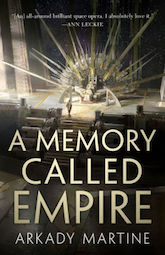As a young child devouring every fantasy book I could get my hands on, I was incredibly lucky to have not only a mentor in my school librarian but also an unlimited transatlantic supply of books from my grandmother’s bookshop back home in the UK. One of the books Grandma sent me was Robin McKinley’s Outlaws of Sherwood; that and the duology of The Blue Sword and The Hero and the Crown cemented my profound love of McKinley’s characterization and accessibility.
I’d read lots of high fantasy before encountering McKinley, and the enormous difference between her heroes and, say, Tolkien’s struck me as both new and welcoming. McKinley’s protagonists are people, not archetypes—fallible, unsure of themselves, practical, vulnerable. As a young reader I could fit myself into Aerin or Harry or Robin or Marian (or Cecily) in a way I’d never been able to fit into Tolkien’s people.
You couldn’t imagine Eowyn having this kind of problem:
“How does one deal with a sword and these thrice-blasted reins?” she said to the small white ears. “There must also be a way to hang the rotten thing so it doesn’t bang into you when you’re not using it. I carry the reins in my teeth—and accidentally strangle myself in them—and meanwhile I can’t shout blood-curdling war cries of Victory! and For Damar! to bring terror into the hearts of my enemies, with my mouth full of reins.”
The little kid I was when I first read that had been on a horse and went “yes!” And because Aerin was real—Aerin was resourceful, and determined, and believable—I found her so much more compelling than other fantasy protagonists. Similarly, McKinley’s treatment of Robin Hood is practically the opposite of the Errol Flynn version, the man who stood on a branch with his hands on his hips and a silly feather in his hat, jovially shouting “Welcome to Sherwood.” McKinley renders the story of Robin Hood far more real: showing the reader his general glum practicality, or possibly fatalism, and his people’s profound affection for him: the leader malgré lui. I’d spent a lot of time camping in various woods as a child and Robin’s refrain of speaking well or ill will not keep the rain out resonated deeply.
Later in life I would come to understand that the mechanism by which McKinley, and other authors whose work affects me particularly strongly, achieve this effect is quite simple: contrast. For me, storytelling is most successful—compelling, enthralling, entertaining—when there is contrast between multiple elements: between setting and plot, plot and characterization, trope and concept. A story in which the ordinary and the extraordinary are juxtaposed either directly or indirectly is inherently dynamic because of that imbalance. I want to read about Bruce Wayne in a dressing-gown making pancakes, or Joe Schmoe discovering a portal to hell inside his office’s supply closet; I want ordinary people doing extraordinary things, and vice versa, and this is precisely what McKinley does best with her approach to fantasy.
Take Aerin’s example above. She is technically a pretty classic fantasy protagonist: a king’s daughter who has inherited her mother’s magic, who defies convention and overcomes challenges to become a dragon-slayer and fight evil mages and demon-mischief in order to save her kingdom. So far, so Quest Pattern. But throughout the book, McKinley makes Aerin also a person, who makes mistakes and does several enormously stupid (but understandable) things; she is also the kind of determined problem-solver who doesn’t magically know the answers at once but who grimly goes on working until she comes up with the solution through hard work and experimentation. A princess who spends her spare time testing thousands of iterations of a recipe until she finds the right one, who teaches herself scientific technique by trial and error, who completely redesigns her horse’s tack to suit the particular needs she anticipates, who does not give up when it doesn’t work at once—she is made out of contrast between her given roles and her chosen course, and between her extraordinary story arc and her ordinary—believable, real—personality.
Buy the Book


A Memory Called Empire
In The Blue Sword, Corlath is both the extraordinary magic king and an ordinary war-leader who happens to have yellow eyes every now and then and can occasionally walk through walls. He is enormously compelling because he is so believable; Mary Renault did the same thing with Alexander the Great, rendered the fabulous figure a brilliant but human creature, and Mary Stewart gave Merlin the same treatment. And Harry Crewe, Homelander with Hill blood who pulls the mountains down on witch-king Thurra’s head and closes Ritger’s Gap with tons and tons of blue-tinted rubble—is a person who has to learn how to be a leader all at once, and is not sure she’s up to the task.
Of these three books, though, Outlaws of Sherwood demonstrates the power of contrast most clearly. McKinley is telling a story we already know, have heard so many times before that we know exactly what we think is going to happen, and practically from the very beginning she turns those expectations on their heads. Robin has no desire to become an outlaw prince, disporting himself in the glorious forest of Sherwood and leading the Sheriff of Nottingham a merry dance; Robin is a miserable and desperate fugitive, and it’s only because of the help of his friends that he actually manages to survive and begin the work of making a new life. It’s because of this lack of heroic defiance that he actually keeps his people alive; his risk tolerance is extremely limited, and he insists that his followers take enormous precautions. In fact he never seems to understand quite why people do follow him, and this is part of why they want to. Here we have contrast between our expectations of the character and of the story, and the way in which all of those expectations are actually—and believably—met.
McKinley’s fantasy is seen through a profoundly human lens, bringing an accessibility, an openness to characters that would otherwise be difficult to identify with. She lets readers fit themselves inside her people, and in doing so renders her storytelling enormously personal to each individual reader, every time they pick up the book. As I grew up, I would find myself searching for that same sense of contrast, of the extraordinary made ordinary and therefore compelling and inviting and accessible, in other stories—not just books, TV and movies, graphic novels, any form of storytelling—and when I found it, I would appreciate it partly because I’d read McKinley. Terry Pratchett does it constantly throughout the Discworld novels; Hilary Mantel’s gorgeous A Place of Greater Safety takes the distant heroes and villains of history books and turns them into people, warts and all, as does Lin-Manuel Miranda in Hamilton; it’s not hard to find but it’s immensely satisfying when you find it.
This kind of contrast has been a profound influence in my own storytelling; McKinley’s work showed me at age 11 that it was not only acceptable to have your protagonists lack high-fantasy self-possession and confidence, to screw things up and fail and struggle with mundane ordinary challenges, but that (if used judicially) it could make those protagonists both stronger and more interesting. In my own work, I enjoy playing with this trope—and I love the experience of getting to see it in new and emerging voices as well.
Vivian Shaw wears too many earrings and likes edged weapons and expensive ink. Her debut trilogy starring Dr. Greta Helsing is published by Orbit; her short fiction has featured in Uncanny and is forthcoming in Pseudopod. She is a stickler for research and currently lives in Baltimore with her wife, the author Arkady Martine. Look for Strange Practice and Dreadful Company now out, and Grave Importance coming in late summer 2019.










